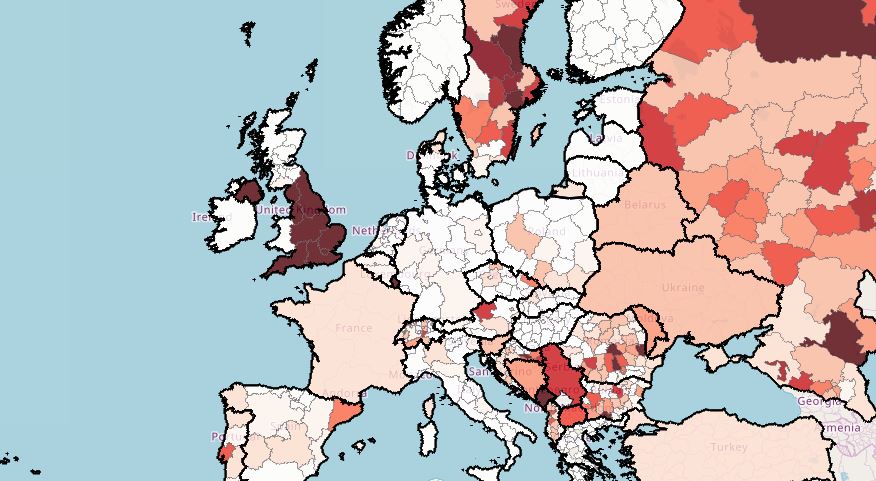As coronavirus infections are flaring up again in many countries, the authorities have reintroduced local lockdowns or other containment measures. An overview.
The European Commission's research centre also launched a tool showing what the coronavirus infection overview is, in detail, throughout Europe, although the figures can sometimes be a few days old.
According to the risk assessment published by the European Centre for Disease Control and Prevention (ECDC) last week, some countries are reporting a resurgence of observed cases or large localised outbreaks.
As of 30 June, the following EU member states and United Kingdom had a 14-day incidence (moving average) of reported cases greater than 10 per 100.000 inhabitants (annex 1 in ECDC´s risk assessment): Bulgaria (21.3), Croatia (11.6), Czechia (16.3), France (10.3), Luxembourg (30.0), Poland (11.5), Portugal (47.4), Romania (22.8), Sweden (149.4) and the United Kingdom (22.7).
Turkey and the other candidate countries in the Western Balkans have all a 14-day incidence per 100.000 inhabitants above 20.
Spain
The city of Lérida in the Spanish region of Catalonia was placed back in quarantine on Saturday afternoon, after several new outbreaks were recorded. Approximately 200,000 people are not allowed to leave the region, and others are not allowed in. Additionally, gatherings with more than 10 people will not be allowed either. An end-date for the lockdown was not announced.
From Sunday, 70,000 people in the north-western coastal region of Galicia were also placed in lockdown again. The inhabitants of 14 municipalities in the A Marina area of Galicia will not be allowed to leave the area, and gatherings with more than ten people will be banned. The measure applies provisionally for five days, meaning until Friday. The situation will then be reassessed.
In the region of Andalusia, in the south of Spain, 55 beaches on the Costa del Sol were temporarily closed this weekend after being overrun by people.
In the meantime, Belgium’s Foreign Ministry has changed its travel advice for Spain from green to orange, meaning that entry into the country could be dependent on some conditions.
Portugal
In the Lisbon region, the coronavirus measures have also been tightened again. Since 1 July, a lockdown was imposed on the approximately 700,000 inhabitants in some 20 neighbourhoods, which is set to last for at least two weeks, until 15 July.
The United Kingdom
While coronavirus measures were relaxed again, and restaurants and cafes were allowed to reopen in England on Saturday, the city of Leicester went into lockdown again earlier this week after an outbreak of infections.
The lockdown will last at least two weeks, and will be re-evaluated on 18 July, according to local media.
Related News
- Travellers cancelling trips to high-risk areas will not be refunded by airlines
- Belgium in Brief: Struggles To Quarantine High-risk Travellers
- Belgium keeps borders closed to travellers from EU's 15 safe countries
Germany
On 23 June, two neighbouring districts (Gütersloh and Warendorf) with a combined population of about 600,000 people were put into lockdown again.
The reason was a coronavirus outbreak in a branch of meat processing factory Tönnies, where 1,500 workers were infected. In Gütersloh, the quarantine was extended until 7 July, and was lifted again on Tuesday.
Italy
The number of coronavirus cases in the country has increased for the sixth day in a tow. According to the Governor of the Veneto region in the north of the country, this was mostly due to "irresponsible behaviour."
In the south, approximately 700 people living in several apartment blocks were quarantined in Mondragone, near Naples, following detected infections. This led to increasing tensions, and even the army being sent to keep control of the situation.
Luxembourg
The country, which has about 600,000 inhabitants, saw its number of infections increase tenfold in three weeks time.
According to official figures, 321 people are infected with the virus in Luxembourg, but in mid-June, there were still 31. The government now also wants to impose compulsory measures for private meetings, such as keeping a distance and wearing a face mask.
Switzerland
The country decided to introduce a number of new measures and the number of new infections gradually increased since mid-June
Since this week, passengers on public transport will be obliged to wear a face mask. Additionally, passengers from 29 countries considered "high-risk" will have to spend 10 days in quarantine upon arrival in the country.
Belgium is not on the list, but Serbia and Sweden are, just like the United States and Russia.
Serbia
On Friday, the country declared a state of emergency in the capital of Belgrade.
The country had initially imposed strict measures, but they were released again quickly. However, since April, the number of infections increased drastically.
Greece will close its border to Serbian residents until 15 July due to a coronavirus outbreak in the country.
Ukraine
The country announced a new lockdown on 19 June.
Maïthé Chini
The Brussels Times

